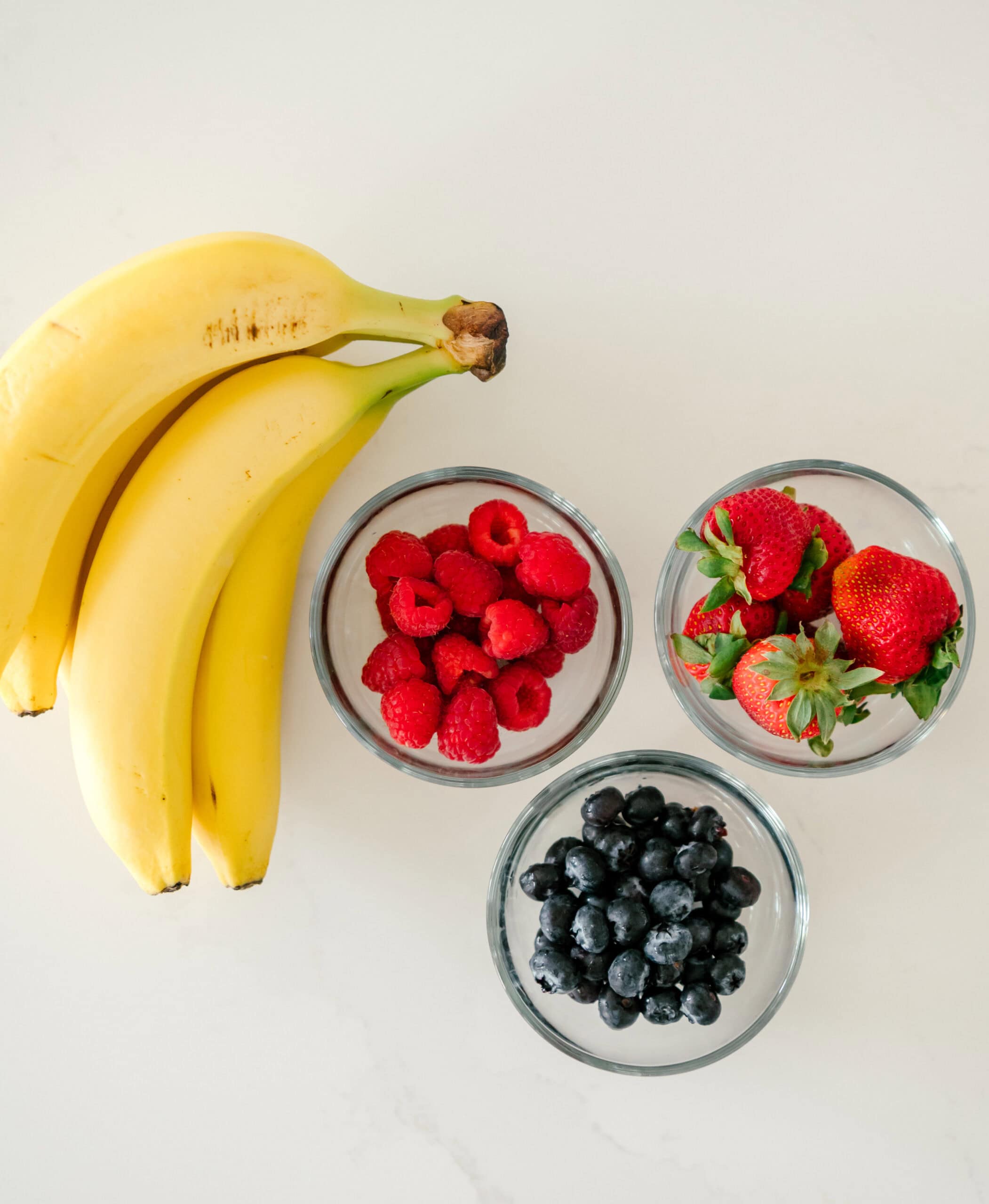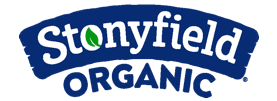As parents, we always want the best for our little ones, especially when it comes to their nutrition. Whether you’re a seasoned parent or new to the journey of feeding a baby, having the right foods on hand can make all the difference. In this guide, we’ll share a quick grocery list filled with foods to always keep stocked for your baby’s meals and snacks, focusing on their nutritional benefits and why they’re great options for your baby’s diet. The next time you head to the grocery store, be sure to take this list with you:
Fruits

Fruits are an important food group to include in a baby’s diet. They have essential vitamins and minerals to support overall growth and development and fiber to help keep things regular.1,2 Here are fruits to keep on hand for baby that provide a variety of flavors, textures, and nutrients, laying the foundation for healthy eating habits later on in life:
1. Bananas
Bananas are a versatile fruit that are easy to digest and gentle on your baby’s stomach.3 They have potassium, which supports healthy muscle and nerve function, and their natural sweetness makes them a favorite among little ones.4,5 Bananas also make for a great first food for your baby. To enjoy, mash and serve them as a standalone puree or mix them with oatmeal or yogurt for added sweetness. You can also make baby banana muffins for a wholesome breakfast or snack.
2. Berries

Berries like blueberries, strawberries, and raspberries have antioxidants, vitamins, and fiber.6,7 These nutrients support your baby’s immune system and digestive health while introducing them to new flavors and textures.2,8 When introducing berries to your baby’s diet, puree them for a smooth texture or offer small pieces as finger food for older babies. Mix berries into yogurt, oatmeal, or cottage cheese for added flavor.
3. Unsweetened Applesauce
Unsweetened applesauce is a convenient and nutritious option for babies. It has vitamin C and fiber, promoting healthy digestion and immune function.2,8,9 Plus, its smooth texture makes it easy for babies to eat and enjoy. To incorporate unsweetened applesauce into your baby’s diet, mix it with oatmeal or yogurt for added flavor and texture, or serve it as a standalone puree. I also enjoy using it to bake healthy snacks like applesauce muffins or pancakes, as it provides natural sweetness without added sugars.
4. Avocado

Avocado has fats, vitamins, and minerals.10 Its creamy texture makes it easy for babies to eat and digest, and its mild flavor pairs well with a variety of other foods. Avocado has been a huge hit with both of my littles and was their very first food! We like to serve it as soft, ripe slices rolled in chia or flax seeds, which makes for an easier grip for little hands. You can also mash it up and offer it as a puree or spread it onto whole-grain toast strips as a finger food.
Vegetables
Like fruits, vegetables have fiber, vitamins, and minerals.2,11 They have antioxidants, too, providing a variety of key nutrients to support immune function and cognitive development.11,12,13 Be sure to add these vegetables to your next grocery list to always have on hand for baby:
1. Sweet Potatoes
Sweet potatoes have nutrients such as beta-carotene, vitamin C, and fiber.14 They’re easy to prepare and can be mashed or pureed for a smooth consistency that’s perfect for your baby’s developing palate. To incorporate sweet potato into your baby’s diet, steam or bake it until soft, then mash or puree it for a smooth texture. You can also cut it into small, manageable pieces for older babies to grasp and explore as a finger food.
2. Carrots

Carrots also have beta-carotene, which is essential for healthy vision and immune function.12,15,16 Their natural sweetness appeals to babies and makes them a nutritious addition to any meal. Babies can enjoy carrots roasted or baked as a first finger food. I also recommend adding finely grated or pureed carrots to oatmeal, yogurt, or homemade muffins.
3. Peas
Peas are small but mighty when it comes to nutrition. They have protein, fiber, and essential vitamins like vitamin K and folate.17 Peas make for a great finger food for older babies who are starting to develop a pincer grasp (around 9-10 months old) and learning to feed themselves.18 Before then, you can mash up peas and make them a puree or spread them onto whole-grain toast strips.
4. Tomatoes
Tomatoes have antioxidants, including vitamin C, carotenoids, and lycopene, that support healthy eyesight, immunity, and heart health.12,16,19,20 Tomato is a versatile ingredient you can cook down into sauces or serve raw as a finger food for your baby. Offer quartered large beefsteak tomatoes to babies 6 months and up. You can begin offering quartered cherry tomatoes once your baby begins working on their pincer grasp (around 9 months of age).18,21
Dairy

Dairy products have calcium, protein, and vitamin D.22,23 It’s not recommended to introduce cow’s milk into your child’s diet until their first birthday. However, you can start feeding your baby dairy products as early as 6 months of age.24,25 Here are my go-to dairy foods to always have on hand to feed baby:
1. Whole Milk Yogurt
Whole milk yogurt, such as Stonyfield’s YoBaby Yogurt, has calcium, vitamin D, protein, and probiotics, making it perfect for tiny tummies. These nutrients support your baby’s bone health and digestion.26,27 Stonyfield’s YoBaby Yogurt Cups are #1 pediatrician-recommended* and suitable for babies ages 6 months and up. It’s become a staple in our household for busy mornings and as a late, after-nap snack. I love that it’s made with real fruit and without the use of artificial hormones or artificial preservatives, making it a wholesome and safe choice for my little ones.
*For babies 6 months – 2 years among refrigerated yogurts (IQVIA ProVoice Survey, 12/01/15-08/31/23)

2. Cottage Cheese
Cottage cheese is a soft and easy-to-digest dairy option for babies. It has protein and calcium, which are essential for growth and development.28,29,30 You can offer cottage cheese plain in a bowl for baby to self-feed with their hands. Or offer it with a preloaded spoon to encourage the use of utensils.
3. Mild Cheeses
Cheese has calcium and protein, making it a nutritious addition to your baby’s meals.31 However, some cheeses tend to be higher in sodium, which you should limit in babies’ diets.32 When choosing cheese for babies, opt for low-sodium, pasteurized options like fresh mozzarella, goat, ricotta, or Swiss cheese.33,34,35,36 Softer cheeses like ricotta can be spread onto whole-grain toast strips. Semi-firm cheeses can be sliced into thin pieces or served shredded or melted into dishes for added flavor and texture.
Protein
Animal and plant proteins are made up of amino acids — the building blocks of life!37 Protein foods support muscle tissue and growth and overall development.38 The next time you head to the grocery store, add these plant and animal proteins to your grocery list for baby:
1. Eggs

Eggs have protein, vitamins, and minerals, including choline and DHA, which are essential for your baby’s growth and development.39,40 Starting as early as 6 months, you can offer strips of fried eggs, scrambled eggs, or hard-boiled eggs or serve them as finger food for older babies.21
2. Meats and Poultry
Chicken thighs, ground beef, and ground turkey are lean sources of animal protein that have essential nutrients like protein, iron, and zinc.41,42,43 Around 6 months of age, a baby’s iron needs begin to increase. Animal proteins such as these have dietary iron.44 You can offer tender chicken thighs or drumsticks for your little one to munch on, mix ground beef or turkey with mashed potatoes, or prepare meatballs or patties from ground chicken, beef, or turkey.
3. Tofu
Tofu has protein, iron, calcium, and other essential nutrients that are crucial for babies’ growth and development.45 Firm or sprouted tofu prepared with calcium sulfate has protein, iron, and calcium.45,46 To offer tofu to your baby, cut soft or silken tofu into small pieces. You could also mash it into a smooth texture and serve it as finger food or mixed into purees or dishes for added nutrition.
4. Beans
Beans are a plant-based source of protein that has fiber, vitamins, and minerals suitable for babies.47 In the early stages, you can mash or puree them for a smooth consistency that’s easy for babies to eat or use chickpeas as a base for muffins. Once your baby begins to develop a pincer grasp, you can offer soft, fully cooked beans flattened.48
Grains
Grains have carbohydrates, vitamins, and minerals and serve as a valuable energy source for babies, supporting brain function and providing necessary nutrients for rapidly growing bodies.49,50,51 Here are two staple whole grains to have on hand for baby:
1. Oatmeal/Baby Cereal

Oatmeal and baby cereal have iron, which is crucial for your baby’s cognitive development and overall health.44,52 Mix it with breast milk, formula, or water to achieve a smooth consistency and offer it as a standalone meal. Or mix it with pureed fruits or vegetables to introduce new flavors and textures. To boost the caloric density, flavor, and overall nutritional value, I also like to mix a thin layer of nut butter!
2. Whole-Grain Bread
Whole-grain bread has protein and fiber and is a nutritious option for introducing grains into your baby’s diet.53,54 It has fiber, iron, and B vitamins, and its soft texture makes it easy for babies to chew and swallow.54 The crusts of bread, or toasted bread, may be better tolerated than untoasted bread for early eaters, as it helps remove some moisture from the bread. This can make it less likely to ball up in baby’s mouth.55 Mash up avocado and beans, or spread a thin layer of nut butter or ricotta cheese to bump up the nutritional value.
Healthy Fats
Healthy fats have essential fatty acids that are necessary for baby’s brain development and cognitive function.56 Below are my go-to healthy fats to keep in stock at home for little ones:
1. Nut Butters

Nut butters like peanut or almond butter have protein, healthy fats, and essential nutrients for baby.57,58 They’re a convenient option for adding flavor and nutrition to your baby’s meals and snacks. You can dilute with breast milk, formula, or water to make a thin consistency your little one can manage. Mix it into yogurt and oatmeal, or spread it onto toast.
2. Olive Oil
Olive oil is a nutritious addition to your baby’s diet that has essential fatty acids for brain development and heart-healthy monounsaturated fats.56,59,60 Its versatility adds flavor to dishes like homemade purees and roasted vegetables, encouraging healthy eating habits from an early age. Opt for extra virgin olive oil for maximum nutritional benefits and store it properly to maintain freshness.61 (Keep it away from your stove, in a dark place like a cupboard or pantry, and with a tight-fitting lid to minimize exposure to heat, light, and air.62)
By keeping these essential foods stocked in your pantry and refrigerator, you can ensure that your baby receives the nutrition they need for healthy growth and development. From fruits and vegetables to dairy, protein, and grains, each food on this list offers a unique set of nutrients that support your baby’s overall health and well-being. With a little planning and preparation, you can create delicious and nutritious meals that your baby will love!





































